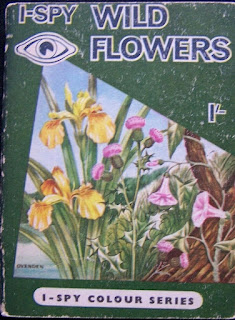On the Farm, Musical Instruments, The Sights of London, On a
Train Journey, At the Seaside, Dogs… so many I-Spy books, covering so much of
my childhood.
I wish I’d kept at least some of those little matching booklets
with their distinctive triangular visual representation of what the eye might
spy on the cover. Good Hunting, rendered into simple gobbldygook
by shifting a few letters to create the impression of a secret code, was the
motto/watchword, which linked with the idea of being a member of a tribe that
was headed by Big Chief I-Spy, no less.
The News Chronicle and Bouverie Street where you sent your completed booklet to receive a special feather from the Big Chief all trigger memories, but powerful as the nostalgia is, that's not the theme of the poem that follows.
I-Spy Wild Flowers
The boxes are empty –
with your bright little eye, what will you spy?
Some things are worth very little –
Gound Ivy trails in the grass of the hedgebank
abundantly creeping and rooting –
Score 5
Some things are worth more than others –
Bugle is common in springtime by roadsides
also in woodland and field –
Score 25
Some things are worth less than others –
throughout Britain you’ll find the Red Dead Nettle
in gardens and wasteland alike –
Score 5
Are those boxes still empty –
with your bright little eye – what have you spied?
Some things have in-between worth –
Yellow Archangel may be sought for in copses
hedgerows and places in shade –
Score 15
Some things are worth a lot more –
Wood Betony, common in pastures, stands
stiff-stemmed, erect and unbranched –
Score 25
Some things are worth slightly less than the last –
Self-heal by the wayside and in pastures
abundant in all grassy places –
Score 20
Now which boxes are full – how much is your score?
With your bright little eye –
did you make 95 –
so you know what’s worth what… perhaps more?
I can
of course understand why some wild flowers are less readily seen than others,
so spying them should attract a higher score – though it does make a difference
where (and when) you find yourself. If
the challenge is to search for and find, with some of the sought-after being
harder to spy, then it’s reasonable to recognise this persistence with a higher
score. Perhaps it was in the In the Country booklet that a working windmill – rare
even in my childhood – gave you a lot of points. All fair enough.
But I
find it interesting to see how strong is our need to use numbers to evaluate.
Worth
is measured – a number appears and a ranking results.
This may
be necessary. The recently much-debated Biodiversity Net Gain metric attempts
to assess natural value (or loss of) for a particular habitat by generating a
number. Important and well-intentioned as such procedures are, they run the
risk of oversimplifying even as they evaluate.
But to return to I-Spy Wild Flowers.
Here we can spot (spy?) a hierarchy being established, not just for the objects that were spied – the red dead nettle and
creeping ground ivy, lovely as they both are, being demoted to little worth – but
amongst the observers themselves.
I’ll
try to avoid the risk now of becoming portentous, with the temptation to make
remarks about man’s need to measure and our capitalist society, but my poem is
asking how valuable is our approach to, and the whole process of, valuation?
And
how much – another question that I recognise invites numeric scoring – is missed
when we emphasise the rewarding of the finding of the pre-defined and the
sought-after, rather than the stumbling upon and cherishing of the unmeasurable
and unexpected?

Comments
Post a Comment